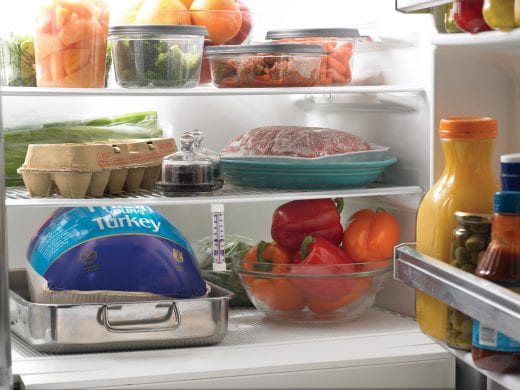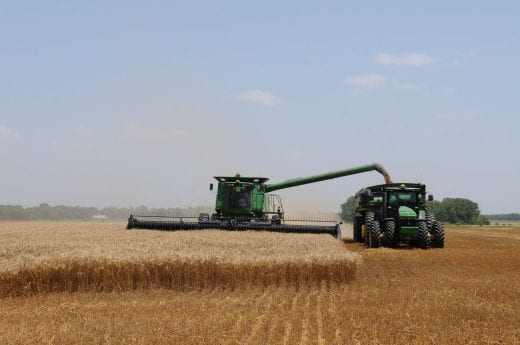In this week’s Better Kansas, we touch on where to go for official COVID19 information, suggestions for cooking with confidence, recommendations for refrigerating and freezing foods, cutting back ornamental grasses, an anaplasmosis vaccine in development and a farmland lease survey. This is a small glimpse of what K-State Research and Extension across the state has to offer. Share with others on social media and subscribe! – Mary Lou Peter mlpeter@ksu.edu
Better Living, Better Communities
 IT’S IN TIMES LIKE THIS, WHEN WE’RE BOMBARDED WITH INFORMATION about COVID19 aka novel Coronavirus 2019, that it’s sometimes hard to determine what’s credible and what’s not. Like many of you, I marveled … and was somewhat perplexed, that not only were the toilet tissue shelves cleared out at my local store a few days ago, but so were the bread, pasta and peanut butter sections. Keep an eye on the Prepare Kansas blog, where we point to sources of official science-based information on topics that affect all of us. It won’t help you find supplies, but it will cut right to the latest official word. If there’s one thing I’m thankful for right now, it’s that the days are getting longer and the weather warmer. Take care and look out for one another.
IT’S IN TIMES LIKE THIS, WHEN WE’RE BOMBARDED WITH INFORMATION about COVID19 aka novel Coronavirus 2019, that it’s sometimes hard to determine what’s credible and what’s not. Like many of you, I marveled … and was somewhat perplexed, that not only were the toilet tissue shelves cleared out at my local store a few days ago, but so were the bread, pasta and peanut butter sections. Keep an eye on the Prepare Kansas blog, where we point to sources of official science-based information on topics that affect all of us. It won’t help you find supplies, but it will cut right to the latest official word. If there’s one thing I’m thankful for right now, it’s that the days are getting longer and the weather warmer. Take care and look out for one another.
 SOME OF US MAY BE COOKING AT HOME MORE THAN USUAL OVER THE NEXT FEW WEEKS. The Cooking with Confidence web page provides a wealth of information to everyone from novices to experienced cooks, with links to resources from K-State and other land grant universities around the country. Topics such as Eating Well Made Easy, Cooking Veggies, Healthy Cooking and Recipes and many more are included. Take a look!
SOME OF US MAY BE COOKING AT HOME MORE THAN USUAL OVER THE NEXT FEW WEEKS. The Cooking with Confidence web page provides a wealth of information to everyone from novices to experienced cooks, with links to resources from K-State and other land grant universities around the country. Topics such as Eating Well Made Easy, Cooking Veggies, Healthy Cooking and Recipes and many more are included. Take a look!
 HAVE YOU EVER PLANNED TO USE THAT PREVIOUSLY OPENED PACKAGE OF CREAM CHEESE IN YOUR EVENING SUPPER, only to find there was a nice layer of mold growing on the surface? Not a welcome sight. A handy guide to Safe Food Storage for the refrigerator and freezer lists all kinds of foods and the recommended maximum amount of time they can be stored there (or if they can be stored there at all). I didn’t know until recently that you can refrigerate or freeze bananas. This confirms it!
HAVE YOU EVER PLANNED TO USE THAT PREVIOUSLY OPENED PACKAGE OF CREAM CHEESE IN YOUR EVENING SUPPER, only to find there was a nice layer of mold growing on the surface? Not a welcome sight. A handy guide to Safe Food Storage for the refrigerator and freezer lists all kinds of foods and the recommended maximum amount of time they can be stored there (or if they can be stored there at all). I didn’t know until recently that you can refrigerate or freeze bananas. This confirms it!
Better Farming, Ranching and Gardening
 MARCH IS A GOOD TIME TO CUT BACK THOSE BEAUTIFUL ORNAMENTAL GRASSES now that winter has mostly slipped away and new growth is starting. Whether you need pruning shears or a chainsaw depends on the type of grass … and your enthusiasm and energy level! The March 10 Horticulture newsletter includes a segment on the topic, plus several others, including fertilizing the garden, cole crops (broccoli, cabbage, cauliflower, etc.), rhubarb, planting potatoes, vegetable spacing and more. I’m by no means an experienced gardener. I’ve grown a few vegetables, including broccoli, but wasn’t familiar with the expressions “bolting” and “buttoning” in cole crop plants. Take a look.
MARCH IS A GOOD TIME TO CUT BACK THOSE BEAUTIFUL ORNAMENTAL GRASSES now that winter has mostly slipped away and new growth is starting. Whether you need pruning shears or a chainsaw depends on the type of grass … and your enthusiasm and energy level! The March 10 Horticulture newsletter includes a segment on the topic, plus several others, including fertilizing the garden, cole crops (broccoli, cabbage, cauliflower, etc.), rhubarb, planting potatoes, vegetable spacing and more. I’m by no means an experienced gardener. I’ve grown a few vegetables, including broccoli, but wasn’t familiar with the expressions “bolting” and “buttoning” in cole crop plants. Take a look.
 GOOD NEWS FOR THE BEEF INDUSTRY: Veterinary researchers at KSU have teamed with Iowa State University to develop a new vaccine platform to produce long-lasting protection against anaplasmosis infection. Bovine anaplasmosis, caused by the blood-borne parasite Anaplasma Marginale, is the most prevalent tick-transmitted disease of cattle worldwide and causes significant disease loss to beef producers in the United States. It can result in aborted calves, lost milk production in dairy cattle, death loss and more. Read an article or listen to the Agriculture Today radio interview on the topic.
GOOD NEWS FOR THE BEEF INDUSTRY: Veterinary researchers at KSU have teamed with Iowa State University to develop a new vaccine platform to produce long-lasting protection against anaplasmosis infection. Bovine anaplasmosis, caused by the blood-borne parasite Anaplasma Marginale, is the most prevalent tick-transmitted disease of cattle worldwide and causes significant disease loss to beef producers in the United States. It can result in aborted calves, lost milk production in dairy cattle, death loss and more. Read an article or listen to the Agriculture Today radio interview on the topic.
 DO YOU WISH YOU KNEW MORE ABOUT WHAT OTHERS IN KANSAS WERE LEASING FARMLAND FOR? It’s especially helpful if you’re thinking of leasing out your own land to your neighbor, Abby down the road or if you hope to lease your cousin Bill’s fields to expand your crop production. To help yourself and others’ understanding of current lease rates, K-State agricultural economists ask that you participate in a Kansas non-irrigated farm lease survey. The survey is voluntary and confidential, and will be open until the end of April. Results will be compiled and available on www.agmanager.info. Questions? Contact the Land Use Survey Center at tsoodle@ksu.edu or 785-532-1517. For a look at how the data will be used, check out the 2016 report.
DO YOU WISH YOU KNEW MORE ABOUT WHAT OTHERS IN KANSAS WERE LEASING FARMLAND FOR? It’s especially helpful if you’re thinking of leasing out your own land to your neighbor, Abby down the road or if you hope to lease your cousin Bill’s fields to expand your crop production. To help yourself and others’ understanding of current lease rates, K-State agricultural economists ask that you participate in a Kansas non-irrigated farm lease survey. The survey is voluntary and confidential, and will be open until the end of April. Results will be compiled and available on www.agmanager.info. Questions? Contact the Land Use Survey Center at tsoodle@ksu.edu or 785-532-1517. For a look at how the data will be used, check out the 2016 report.
_
For more resources and activities, contact the K-State Research and Extension office in your area. Check out our other blogs and subscribe to our weekly emails here: https://www.ksre.k-state.edu/news/blogs/

